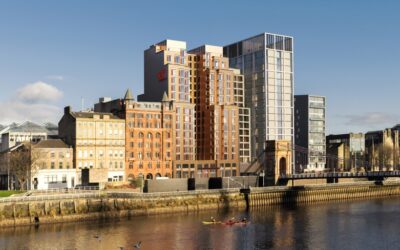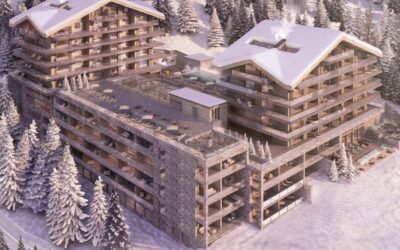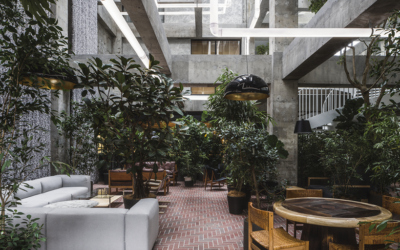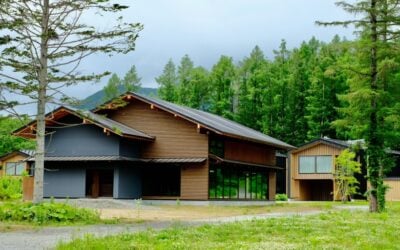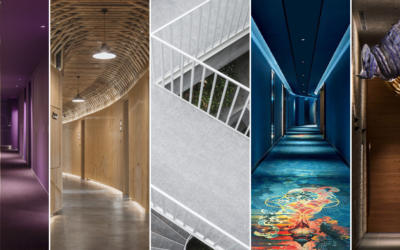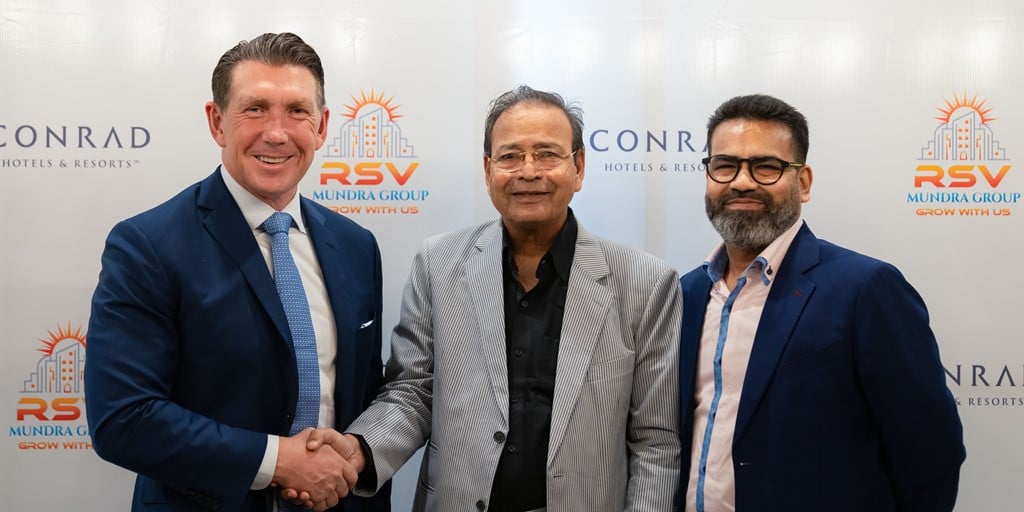The big interview: Dexter Moren, founding director, Dexter Moren Associates

Dexter Moren Associates’ founding director talks to our editor-in-chief Richard Frost about the hospitality design practice’s current pipeline, window shakers and Tesla Powerwalls.
It’s been exactly 30 years since Dexter Moren established the London-based architectural and interior design practice that bears his name. In an exclusive conversation, he explains what the hospitality specialist is doing to navigate the pandemic, shares insights into his day-to-day role, and reveals how he’s been experimenting with cutting-edge technology to charge his own electric car.
How has Dexter Moren Associates coped with the challenges of the last couple of years?
The uncertainty around how Covid would affect the business was really difficult, as was the fact that suddenly we had to leave the office and go home. We all had to learn fast how to work together using Zoom and Teams, but in fact we did really well I think.
There was the initial shock of it all, but we coped, and we learnt a lot. It might affect business travel for longer than we think though because we discovered that it wasn’t always important to visit a location. We do a lot of work in Africa, for example, and we’ve been progressing those projects on Zoom calls out of London, whereas normally we’d be taking long journeys to site.
But we weren’t like those hoteliers who suddenly saw their hotels close and their income dry up. We had a pipeline of funded projects under construction that didn’t stop – people carried on building.
What hotel projects have you completed recently that you’re particularly proud of?
There’s the Westin hotel in the City of London (The Westin London City). I’ve been working on that for over a decade and it’s just opened, which is quite exciting.
We’ve also opened a hotel in Rome (Hotel Villa Pamphili), which was a nice project, as well as a Curio hotel in Cambridge (The Fellows House, Cambridge) and a Malmaison in York (Malmaison York). And we’ve opened the Hyatt Place in Aldgate (Hyatt Place London City East), which has got a nice roof bar with great views across the London skyline from the eastern end.
So it’s been busy for us and we hope it continues.
What upcoming projects are you working on?
We work consciously on a north-south axis because it’s much easier if we can avoid suffering jetlag. So we focus on Europe – we’re working at the moment in the UK, Germany, Italy, Portugal, Spain and Georgia. We’re also doing some projects in the Middle East. And we have a lot of projects in Africa.
We’re just kicking off onsite with a new Tribe hotel at Manchester Airport (Tribe Manchester). And in Africa, we’re doing the InterContinental in Lusaka (InterContinental Lusaka), a Sheraton in Lagos (Four Points by Sheraton Lagos), a Marriott in Casablanca, a Radisson in Ghana (Radisson Red Accra) and a Hilton in Angola.
How much involvement do you have day to day in each project?
I started the practice 30 years ago in February and always pride myself on the fact that I’ve managed to pick a great team along the way. Having started with just three people, now we have 75. We have a management team made up of 20 people who are all shareholders – ten partners and ten associates – so I’m not the big owner employing all these people.
I’m a firm believer in sticking to what you’re good at. So I’m quite good at some of the creative stuff, space planning, looking at projects in the early stages and so on. I’m just one of the partners in that sector, but it’s not a case of overriding anyone. Equally, there are other people in my office that are much happier with the construction phase who like to be onsite. And then we have another team that does interiors – I’m not an interior designer, but we’ve got really good guys there.
We’re an equal team. My role is in the design stage, taking projects to planning, and I work on perhaps three, four, five or six projects at a time. I also do a little bit of business development, as I know a lot of people who call me up to talk about projects.
What are you doing to make hotel design more sustainable?
A lot of the work we do now is with existing buildings. Ten years ago, you’d probably just knock them down and start again, but today the first thing you look at is how they can be reused to reduce the carbon cost.
We’re also looking at different ways of heating and cooling buildings. Instead of a big centralised plant pumping air through ducts all day and all night, we’re going back to thinking of more localised systems on a room-by-room basis, where people can turn things on or off without affecting the whole building.
When I was a young man, they used to jokingly refer to air-conditioning units on the sides of buildings as window shakers. We moved away from that and everyone got big centralised plants. But the new units aren’t noisy and don’t shake anymore – they’re actually small, quiet and efficient.
Similarly, I built myself a new house recently, and put solar panels on the roof connected to a Tesla Powerwall, so I can store energy and use it to charge my electric cars. In mid-summer, I was generating about 30% of my electrical requirements for the house through solar. And it’s possible to make use of these technologies in hotels too.
To what extent do you specify local materials on your hotel projects?
As a company, we’re very aware of trying to source things more locally.
During the pandemic, we were working on a particular building, and the exterior stone panels weren’t coming over at the rate promised. When we looked into it, we discovered that this stone was being mined in Portugal, then sent to China to be laminated, before being brought to the UK. Now that’s insane.
Moving forwards, we’ll be questioning the source of all the materials we specify.
How do you think hotel design will evolve over the coming years?
During the pandemic, obviously, many hotels were closed, but aparthotels weren’t because they were seen as living spaces. So there’s a real migration among hotel groups and new brands entering the market towards creating a hybrid model. You’ll find within a single hotel both long-stay and short-stay accommodation, some with kitchens and some without. It’s not split like it used to be, and I think that’s a new trend.
There are a couple of brands that do everything from dormitories to suites – it’s extraordinary. We’ve even been helping a particular brand look at how they can be a bit more flexible in terms of their offering.
We see hospitality becoming much broader, which is good for us because we specialise in hospitality. We’ve morphed from just doing hotels to doing a lot of hospitality-driven schemes – co-living, student, coworking, PRS (private rented sector) and so on. I think the world is becoming much more interesting and varied. It’s not segmented anymore – there’s a lot of flexibility.
Related Articles
Hyatt Regency Cambridge new renovation by Campbell House
The design takes cues from the traditional, scholarly atmosphere of the nearby universities and combines this aesthetic with industrial details and eclectic furniture to create a playful environment for students, business travelers, and families alike. Situated on...
Virgin Hotels previews second UK site
Imagery courtesy of Virgin Hotels. Virgin Hotels has given a sneak peek at its upcoming Glasgow development ahead of its opening in December this year. Virgin Hotels Glasgow is the second site for the brand in the UK and will feature 240 Chambers spanning across 15...
Six Senses to open highly anticipated Swiss resort this December
Imagery © Six Senses. Six Senses Crans-Montana is on track for making its debut, just in time for the 2022-23 winter season, at the end of the year. The year-round slope-side property promises to combine vitality, serenity and adventure in a space featuring luxury...
Design concept: Shiroiya Hotel
Imagery © Katsumasa Tanaka. This week’s TOPHOTELDESIGN exclusive places the focus on industrial-chic Shiroiya Hotel featuring a man-made grassy hill. The 2020-completed hotel in Japan is the result of a collaborative design effort between several architecture and...
Boutique brand rebuilds historic houses for Japanese luxury resort
Imagery courtesy of The Pavilions Hotels & Resorts. The Pavilions Hotels & Resorts is relocating 19th century traditional kominka Japanese houses for a new luxury resort in Hokkaido. The Pavilions Niseko Resort will launch in Q4 2024, and the build includes...
Design showcase: Top 5 corridor designs
This week’s collaboration with TOPHOTELDESIGN highlights the hotel hallways which make moving from one area to the next a fascinating exploration. We have chosen five properties which focus on the journey as well as the destination. These corridors not only lead to...
ABOUT THE DESIGNER

Dexter Moren Associates is an award-winning practice of architecture and interior design specialists working right across the hospitality spectrum.










